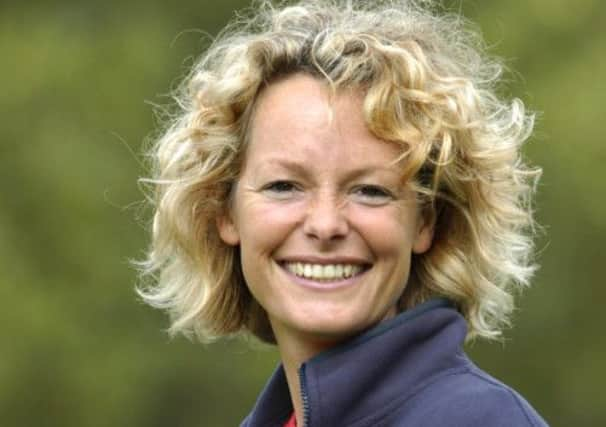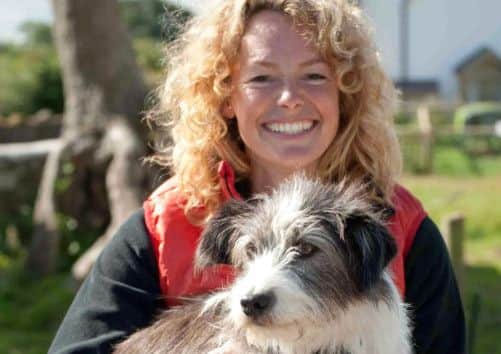The Big Interview: Kate Humble


They say, in television, that you should never work with children and animals.
In Kate Humble’s case, though, working with the latter has turned out rather well. For more than a decade she’s been a popular and recognisable face on our TV screens, thanks to shows like Springwatch and Autumnwatch, during which time she’s done everything from birdwatching to swimming with sharks.
Advertisement
Hide AdAdvertisement
Hide AdShe’s also worked with some of the best-known wildlife experts on TV, including Simon King, Chris Packham and the incomparable Sir David Attenborough.


When she and her husband, Ludo, upped sticks in 2007 and swapped their London townhouse for a smallholding in rural Wales, perhaps the only surprise was she hadn’t returned to the countryside sooner.
“I grew up in the country but like so many people I headed for the big city, in my case London,” she says.
As her career took off she found living in London quite handy, even though she admits she wasn’t cut out for city living. “I don’t feel like I fit in really. I’m a bit of a country bumpkin at heart and I found the sophistication of city life harder. I’d always planned to live in the country but suddenly 20 years had gone by.”
Advertisement
Hide AdAdvertisement
Hide AdAfter taking the plunge and moving to Wales she realised just how much she missed countryside life. “I was shocked by just how much re-connecting with the land mattered to me,” she says.
In 2010, they stepped in when a council-owned farm just outside Monmouth in South Wales was due to be sold and broken up into lots. They felt the 117-acre farm, which had been by run local farmers for four generations, was too important too lose and persuaded the council to let them take it on.
They teamed up with tenant farmers Tim and Sarah Stephens, who breed Welsh Mountain sheep and Hereford cattle, to try and create a successful working farm that supports other rural businesses.
Humble charts their new life in Wales – and all the trials and tribulations that came with it – in her book Humble By Nature, Life, lambs and a dog called Badger. It’s a highly personal tale that features an array of animals including two donkeys, Bertie and Lawrence, pigs Myfanwy and Blackberry, a couple of goats and the aforementioned dog, and next week she’s at the Ilkley Literature Festival where she will be talking about her country odyssey and the ups and downs of rural life.
Advertisement
Hide AdAdvertisement
Hide AdShe regards the tenant farmers as partners in the business. “They care for the day to day farming because they have the experience that I don’t,” she explains. “We wanted to give people who don’t come from a farming background the opportunity to come to a working farm and to make a connection between the land and food because it’s something we’re losing at a rapid rate.”
She worries that people are trying to beautify rural life. “I think we try to pickle parts of the countryside and create this country idyll. But this kind of chocolate box image isn’t real. For the countryside to be viable it needs to be allowed to work and play a productive role. It’s not just a place to go with a picnic at weekends.”
She says allowing people to come and experience farm life for themselves has proved hugely popular. “People love it. A lot of them have never seen a pig in a field before. But they’re not freaks, they’re well educated, they’ve just never had the opportunity before.
“People aren’t ignorant about the countryside because they want to be, they are because they don’t have the opportunity to sniff a Welsh white pig – and I think everybody should have that opportunity,” she says.
Advertisement
Hide AdAdvertisement
Hide AdHumble was born in London and describes her childhood as idyllic. “It was like something straight out of The Famous Five,” she says. “”Wildlife was as intrinsic as mud and we had a house and garden that was surrounded by fields, I was very lucky.
“You hear terrible stories these days about children growing up without venturing more than 10 metres from their front door, whereas there used to be a gang of us kids and we’d go off for the whole day.”
She says she didn’t enjoy school and found the whole rigmarole of exams too restrictive, so when she finished her A-Levels rather than going off to university she saved up to go to Africa. “I’m not cut out for an academic life and from an early age I had this yearning to be independent and luckily my parents furnished me with the ability and confidence to follow this.”
But despite being surrounded by nature when she was growing up she didn’t really appreciate it until she travelled to Africa. “I saw strange wildlife that had big teeth and trunks and suddenly I became much more aware of the natural world. It was the unfamiliar that turned me on to the familiar, it tapped into something.”
Advertisement
Hide AdAdvertisement
Hide Ad“Wildlife is something we see every day and although you might not think there’s anything extraordinary about a blue tit, if you stop and watch it and see what it does, then actually there is.”
Humble spent a year in Africa working as a waitress on a crocodile farm in Zambia and a truck driver for a safari company before returning to the UK in 1989.
She came up with the the idea of working in TV. “I thought it would be interesting, although I’m not sure where that came from. We used to watch The Muppets as a family but we weren’t avid TV viewers.”
Nevertheless, she got a job for corporate video company starting out as a runner and tea maker. “I never planned to be on screen, I was much more interested in being a researcher because I loved tracking down experts and getting them to explain things.”
Advertisement
Hide AdAdvertisement
Hide AdShe joined the BBC in 1997 working on the Holiday programme. “I was described as a travel writer, which was slightly over-generous, and on the second day I was asked to do a screen test. I protested but agreed to do it thinking it would quickly be forgotten, but three weeks later I was presenting a programme in France.”
From here she quickly made her way up the TV ladder, becoming a presenter on Animal Park and making regular appearances on Countryfile and Top Gear. Then in 2002, she teamed up with bird-watching former Goodie Bill Oddie and wildlife camerman Simon King to do a week of live wildlife programmes from gardens in Bristol. This paved the way for Springwatch, which has become a fimr favourite with viewers.
Over the years she has made wildlife programmes all over the world and says some of her most memorable experiences have come from filming underwater. “I swam with basking sharks off the coast of Scotland. I’d never seen one up close before and it was just extraordinary, although seeing something seven metres long coming towards you with its mouth wide open is a bit disconcerting. You know it won’t eat you but you can’t help thinking ‘can it really differentiate between me and plankton?’ But to see it in its own habitat like this was a very humbling experience.”
She recalls another occasion when she was filming off the west coast of America. “I was lying on the sea bed talking into a special mic about cushion stars and the cameraman pointed to a sea lion that was looking at me. It was quite young and it had this wonderful quizzical expression and then it started showing off and doing this balletic display, it was gorgeous.” Has she ever been in situations where she’s felt scared? “We were in the Amazon filming underwater and there was virtually no visibility and you’d get hit by something and you had no idea what it was, which was very disconcerting. Also when you’re filming sharks you have to be aware, because they’re much better at being underwater than you are.”
Advertisement
Hide AdAdvertisement
Hide AdShe says one of the closest shaves was when she wasn’t actually filming. “We were in Africa and a hippo came under our boat. They’re very territorial and they’re responsible for more deaths in Africa than any other animal. We were in a canoe and it was very scary and for a moment I thought my number was up. The hippo was just six feet away although I swear it was laughing at us.”
But she’s worried that we’re losing our sense of connection with the land. “We now have a generation of parents that don’t know how to grow their own veg and don’t know what some animals look like and that’s being passed on to their children. It scares me, it really does,” she says. “So we’re trying, in our very small way, to give people a sense of the value of the land and what it does for us.”
She hopes, too, that programmes like Springwatch and Autumnwatch can help make the natural world more accessible. “We talk about birds and animals that everyone can see and experience. A lot of people do feel disconnected from the countryside and hopefully shows like these can bridge that gap.
“I think people need to realise that wildlife is for everyone to enjoy and that you don’t have to wear khaki and have expensive binoculars to be allowed into the gang.”
Kate Humble is appearing at Kings Hall, Ilkley, on October 15. For more information call the festival box office on 01943 816714. Humble By Nature, published by Headline, is out now priced £16.99.